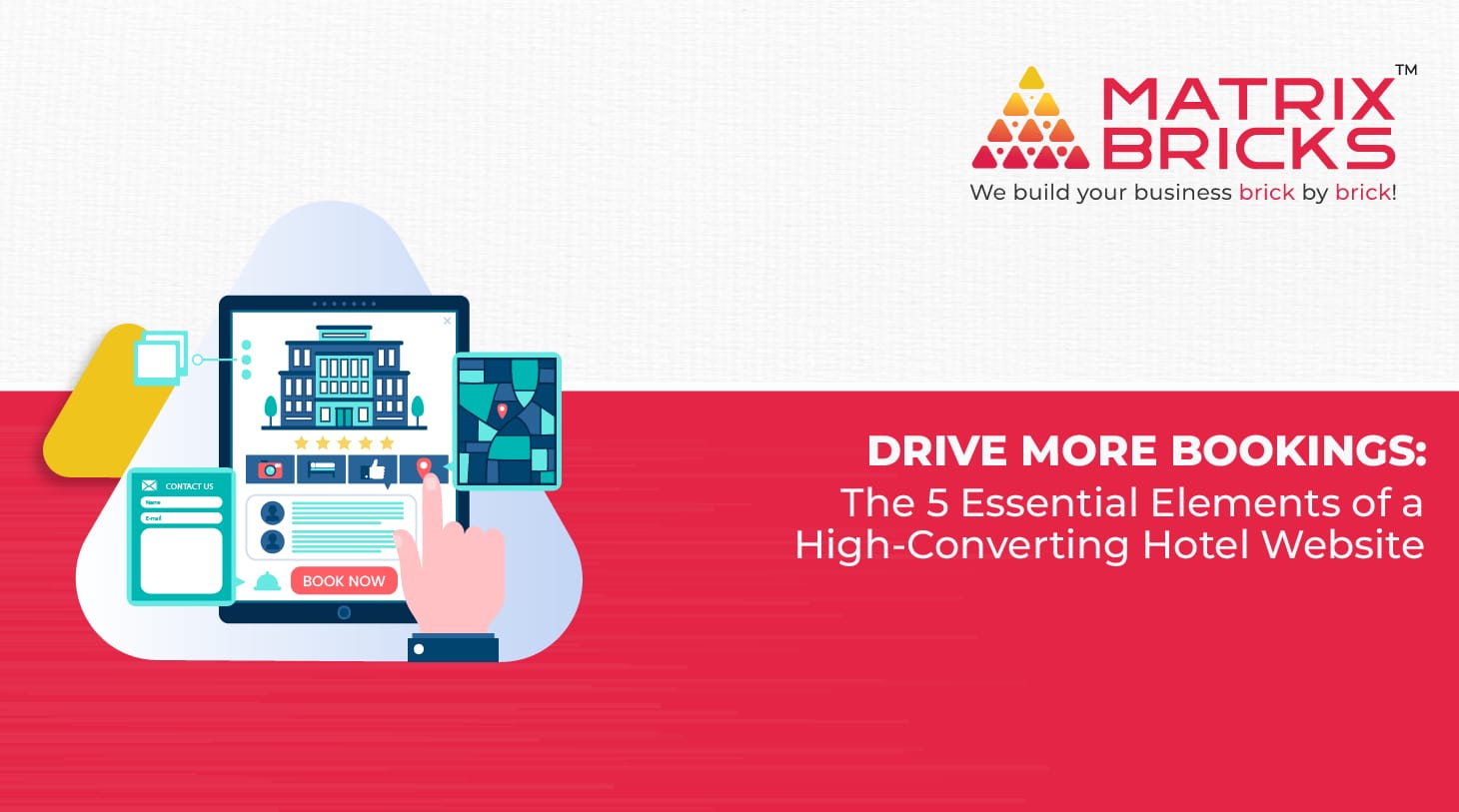
In today’s digital-first world, a customer’s first contact with your property is your hotel’s website. A compelling, well-designed website might be the difference between filling rooms and losing guests altogether. Your hotel website needs to convert visitors into guests as quickly as possible, and effective practices during hotel website development might make this possible.
Here are the five key considerations to ensure your hotel’s website is high-converting, user-friendly, and in sync with modern traveler expectations.

1. More user-friendly interface and navigation
A smooth user experience is essential to retaining potential guests. Visitors to your hotel website should know where to click, how to get information, check availability, and book a room right when they land on it.
Your hotel website design should contain the following:
- Clear menus that read quickly, like “Rooms,” “Gallery,” and “Book Now.”
- Fast pages that load in under three seconds to lower the bounce rate.
- Intuitive layout, ensuring visitors can navigate smoothly from the homepage to the booking engine.
- Mobile responsiveness caters to users booking from smartphones or tablets.
Along with these basics, add a sticky navigation bar that follows the user as they scroll. This will ensure essential links like “Book Now” are always accessible. You could also include a site search bar to make it easier for visitors to find what they need quickly: information on amenities, dining options, or local attractions.
Poor design frustrates a potential guest, pushing them away. A careful and well-planned hotel website means ensuring your site gives them that all-important first good impression.
2. Captivating Visual Content
High-quality images and videos attract guests to your hotel rather than competitors. Since most people are visual, they use photographs and videos to understand your property’s atmosphere and amenities. Include the following information on your website:
- Professional photos of rooms, services, and surrounding attractions.
- Virtual tours or videos offering a walk-through experience of your property.
- Photogalleries with images of the highest resolutions are used to obtain good viewing images of a hotel.
Investing in drone footage can also give potential guests a unique aerial perspective of your property and surroundings. Including before-and-after renovation, photos can further highlight improvements and reassure guests of your commitment to quality. Additionally, captions for each image can provide context and reinforce your hotel’s unique selling points.
Testimonials and guest experience videos can also add credibility and drive bookings. They make your hotel more relatable because they are based on real stories about satisfied guests, which is crucial for attracting new visitors.
3. Smarter booking process
If it takes too long or is very complicated to book, they will leave it during the booking process. The goal is a simple and frictionless booking process. This means an optimized booking experience on your hotel website should feature the following:
- A large, clear “Book Now” button on every key page.
- A booking form with less redundancy, asking for only basic information.
- Multiple payment options for preference, such as credit cards, PayPal, etc.
- Explicit confirmation and follow-up emails will reassure guests that their booking is completed.
Calendar integration to display live rates and availability could be added as one more feature set that eases booking procedures. A progress bar within the booking could be added to give guests an idea of where they are so that they don’t drop off. Providing cancellation options or a ” reservamos, pay later” policy reduces the reluctance to book, encouraging others to complete bookings due to having more flexibility.
This will increase user experience and conversion rates, converting prospects into confirmed bookings.
4. Search Engine Optimization to gain visibility
It doesn’t matter how great and beautiful your website is if you are still looking for it. This is where hotel website search engine optimisation comes in handy. SEO improves ranking on any search engine, such as Google, and potential guests can easily find your hotel.
To enhance your website’s SEO
Research the keywords “hotels in [city]” and incorporate them naturally into your content. Develop relevant blog content on local attractions, travel tips, and hotel features.
- Optimizing the meta title, meta description, and headers with target keywords.
- Improve the loading speed of your website and make it mobile-friendly.
- Create quality backlinks from respected travel websites or local directories.
In addition, make sure your images have alt text describing the content for search engines and accessibility. A Google My Business listing that links to your site will also help increase local search visibility. An efficient hotel website search engine optimisation technique increases your website’s visibility to travelers surfing online, thereby improving your chances of getting bookings.
5. Trust-Building Factors
Much trust lies in online bookings. Guests want assurance that their money goes into a worthwhile, safe, and reliable system. Elements of building trust raise confidence and also determine which one to book.
The main things to create trust on your website are Guest reviews and testimonials of happy experiences.
- Trust badges or certifications guarantee secure payment and hygiene standards.
- Often asked questions about concerns (Cancellation policies, check-in time, etc.).
- A contact page with phone numbers, email addresses, and an address is provided.
Adding a live chat feature can provide instant support, answering guests’ last-minute questions before booking. To increase your credibility, you can also showcase your accolades and recognition. Last but not least, your privacy policy should be accessible and should explain how guest data is protected. All the above features contribute to transparency and reliability, so there is a push for guests to book pre-arrival.

Hotel Website Best Practices for Results
In a nutshell, these five key factors ensure that your website is following the best practices for better conversion rates:
- Friendly to the navigation: Make the information easily accessible and make bookings easy.
- Inspire confidence through quality images and video content.
- Simplified booking process: Smooth and easy reservation process.
- SEO Strategy: Improve your hotel search engine rankings optimisation and attract more guests with effective SEO strategies tailored to the hospitality industry.
- Trust-Building Features: Reviews, FAQs, and contact information should be available for the guests.
Why Effective Hotel Website Development Matters
A strategically designed website can be a key differentiator in the competitive hospitality industry. Effective hotel website development goes beyond visual appeal, focusing on enhancing functionality and user experience and, ultimately, driving conversions.
- A user-friendly hotel website that is easy to navigate and provides all the necessary information is crucial for converting potential guests into bookings.
- A well-designed hotel website with a user-friendly booking interface and effective SEO strategy can significantly increase conversions and drive more traffic to your site.
- Boost guest satisfaction with a professional and trustworthy online presence.
- Boost direct bookings and increase revenue with a strategic approach.
By incorporating user-friendly design, engaging visuals, seamless booking processes, effective SEO, and trust-building elements, you make your site stand out and turn visitors into loyal guests. It is about keeping up with the trends and meeting the expectations of today’s travelers, which would help ensure your property succeeds in the digital age. Optimize your hotel website today and see bookings soar!
Final Thoughts
Your hotel’s website is a key driver of bookings and revenue. By incorporating user-friendly design, engaging visuals, seamless booking processes, effective SEO, and trust-building elements, you ensure your site stands out and converts visitors into loyal guests.
Investing in professional hotel website development is not just about keeping up with trends; it’s about meeting the expectations of today’s travellers and ensuring your property’s success in the digital age.





